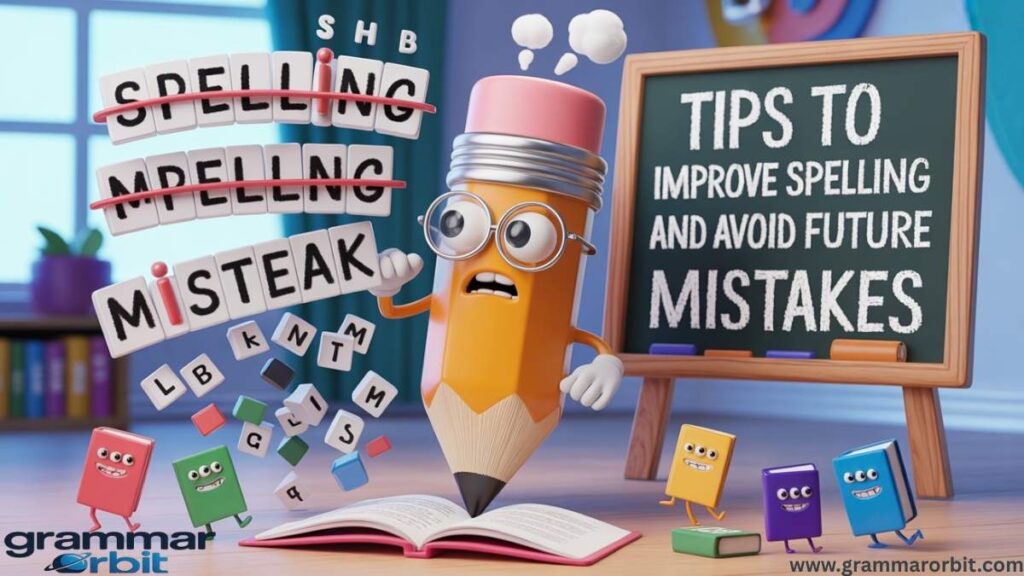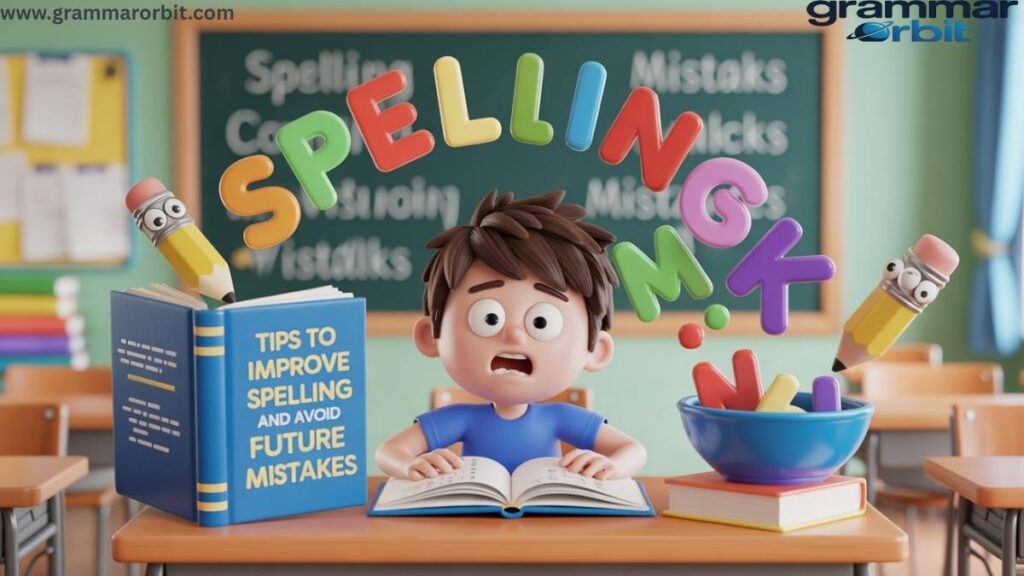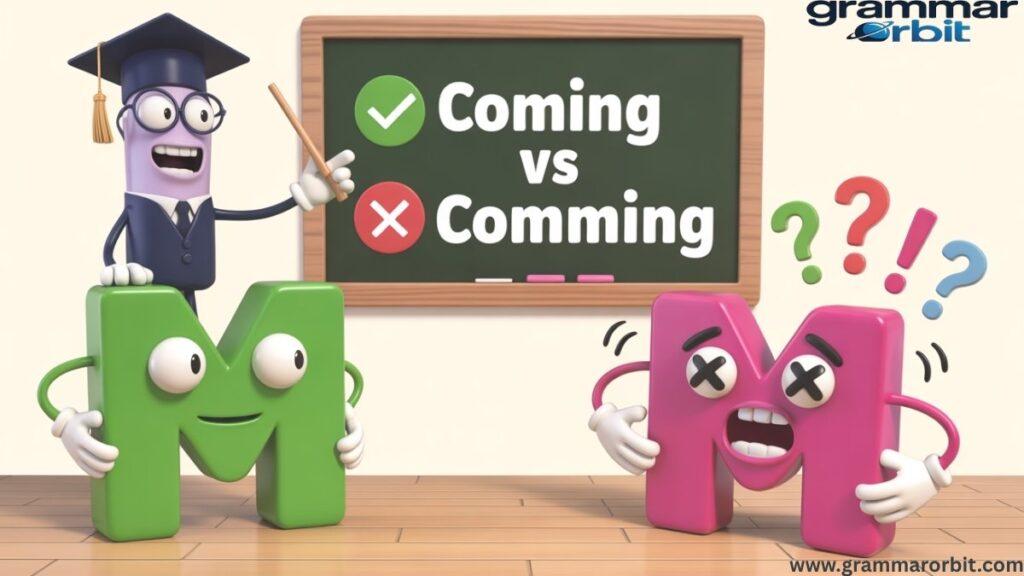Ever typed comming instead of coming and felt that weird itch that something’s not quite right? Don’t worry you’re in good company! The comming vs coming mix-up has fooled students, professionals, and even big brands (yes, billboards have made this mistake). But here’s the truth: only one of these spellings belongs in your dictionary, and the other… well, in the spelling hall of shame. In this fun and easy grammar guide, we’ll settle the comming or coming debate once and for all, uncover why one is correct, and share foolproof tricks to make sure you never commit this classic typo again. If you’ve ever typed comming soon and later realized something looked off, you’re not alone. This common mistake confuses both native speakers and English learners. The words comming and coming look similar, but only one is correct. In this detailed grammar and spelling guide, you’ll learn why coming is the right word, why comming is wrong, and how to remember the difference forever.
The Correct Spelling: Why “Coming” Is Right
The right spelling is coming. It’s the present participle of the verb come, used to describe an action in progress or movement toward something.
When you add “-ing” to verbs ending with a silent “e,” English follows a simple rule:
Drop the “e” before adding “-ing.”
That’s why:
come → drop the “e” → add “-ing” → coming
Here are more examples that follow the same pattern:
| Base Verb | Rule Applied | Correct Form |
|---|---|---|
| make | drop “e” + “ing” | making |
| bake | drop “e” + “ing” | baking |
| take | drop “e” + “ing” | taking |
So the correct spelling of coming always includes one “m.” Doubling the “m” would break standard English spelling rules for verbs(Comming vs Coming).
Why “Comming” Is Always Wrong
The word comming doesn’t exist in English. It’s a spelling mistake, not an alternate version. People often assume it’s correct because many English words double consonants before adding “ing,” such as running, stopping, and swimming.
But those words follow a different rule. They have a short vowel sound followed by a single consonant, like run or hop. In those cases, English doubles the final consonant before adding “-ing.”
The word come doesn’t fit that pattern. It has a long vowel sound and ends with a silent “e.” Doubling the consonant would make it phonetically and grammatically incorrect. That’s why comming is wrong every time.
The Grammar Behind “Coming”
The word coming has two main grammatical roles:
- As a verb (present participle) used in continuous tenses.
- Example: She is coming to the meeting.
- Here, “coming” describes an action in progress.
- As a noun (gerund) used to describe an event or arrival.
- Example: His coming surprised everyone.
- In this case, “coming” acts like a noun, representing an arrival or occurrence.
Understanding this coming grammar rule helps you use it correctly in both everyday speech and writing.
KMG Meaning in Text: Definition, Uses, and Contexts Explained
Why People Misspell It as “Comming”

The comming vs coming difference often trips people up because English has inconsistent spelling patterns. Here’s why this particular error happens:
- Overgeneralization Learners assume every word with a short vowel doubles the final consonant before adding “-ing.”
- Phonetic confusion “Coming” sounds like it could have two “m’s.”
- Visual influence Similar-looking words like committed and running lead writers to copy the double-consonant pattern.
- Typing habits Fast typing or autocorrect can slip an extra “m” into the word.
Once you understand the rule that come keeps a single “m,” the confusion disappears.
Impact of Misspelling on Communication
Spelling errors like comming may seem small, but they affect clarity and professionalism. Imagine a business poster that says “Comming Soon!” It looks careless and unprofessional, even if the message itself is clear.
In professional settings, small mistakes can make readers question your attention to detail. Correct spelling, on the other hand, signals confidence, education, and credibility. Whether you’re writing an email, posting online, or publishing content, spelling accuracy matters more than you think(Comming vs Coming).
Quick Memory Tricks to Remember “Coming”
Here are a few easy ways to remember the correct spelling of coming and avoid the comming spelling mistake:
- Drop the E, don’t double the M.
- Visual reminder: COME + ING = COMING.
- Say it aloud: No double M when you come in.
- Practice: Write similar words that drop the silent “e,” such as hope → hoping and bake → baking.
If you repeat these patterns, you’ll naturally remember how to spell coming correctly.
Totalling vs Totaling: Easy Rules for Correct Usage
Words That Sound Similar (But Aren’t the Same)

English is full of words that sound alike but have completely different meanings. These are called homophones or near-homophones.
The most common confusion here is between coming and cumming. They sound the same but mean very different things. The second word is slang and not appropriate for formal writing.
| Word | Meaning | Example |
|---|---|---|
| Coming | Arriving or approaching | He’s coming home soon. |
| Cumming | Informal slang | Not suitable for formal or polite contexts. |
Always check your spelling carefully to avoid using the wrong word by accident.
Commonly Misspelled “ing” Words
Many verbs in English change when “-ing” is added. Recognizing the spelling patterns in English helps you avoid mistakes like comming (Comming vs Coming).
| Incorrect | Correct | Rule |
|---|---|---|
| runing | running | Double consonant after short vowel |
| stoping | stopping | Double consonant after short vowel |
| comeing | coming | Drop silent “e” |
| hopeing | hoping | Drop silent “e” |
| moveing | moving | Drop silent “e” |
These examples show that English spelling follows predictable rules once you understand verb + ing rules in English.
Tips to Improve Spelling and Avoid Future Mistakes

If you struggle with spelling, practice these proven techniques:
- Read regularly. Exposure to correct spelling improves recognition naturally.
- Write often. Writing strengthens your memory and reinforces patterns.
- Learn the rules. Study when to drop the “e” and when to double the consonant.
- Proofread carefully. Always recheck your writing before posting or sending.
- Build word families. Group words with similar endings (make, bake, take) to remember consistent rules.
These spelling improvement techniques can help you build confidence in your writing and prevent simple errors.
The Opposite of “Coming”
The opposite of coming is going. Both verbs describe movement, but in opposite directions.
| Word | Meaning | Example |
|---|---|---|
| Coming | Moving toward a place or event | She’s coming to the party. |
| Going | Moving away from a place | He’s going home. |
| Leaving | Departing or exiting | They’re leaving now. |
Understanding antonyms of coming deepens your grasp of English verbs and helps you use them correctly in different contexts.
OOP Meaning in Text: Definition Usage and Contexts
Case Study: The Cost of a Simple Mistake

A few years ago, a local company launched a new store campaign with banners saying “Comming Soon!” Within hours, customers noticed the error. Screenshots spread across social media, and the company became a target of jokes online.
After correcting the spelling to “Coming Soon,” they learned an important lesson: small errors can cause big embarrassment. It’s a real-life reminder that paying attention to detail especially in spelling builds trust and credibility.
Facts About the Word “Coming”
- Etymology: Comes from Old English “cuman,” meaning “to move or approach.”
- Root origin: Traces back to Proto-Germanic “kweman,” related to German “kommen” and Dutch “komen.”
- Word form: Base verb “come” + suffix “-ing.”
- Part of speech: Present participle (verb) or gerund (noun).
- Common phrases: “coming soon,” “coming of age,” “the coming storm.”
These facts show how the linguistic root of come has remained consistent over time, making its spelling predictable once you know the rule.
Reference: Cambridge Dictionary Definitions
Here’s a trusted source for clear word meanings:
FAQs
What is the difference between come and coming?
Come is the base verb, while coming is its present participle form.
- Come refers to the action itself (Example: Please come here.)
- Coming shows that the action is happening or will happen soon (Example: He is coming home.)
In short, come is the root, and coming is what happens when you add ing.
What is the meaning of comming?
Comming has no meaning in standard English. It’s simply the wrong spelling of coming. Many people mistakenly double the “m,” but the correct form is always coming.
Is itComming vs Coming in?
It’s coming in, always.
Example:
- ✅ She’s coming in late today.
- ❌ She’s comming in late today.
The second version will instantly get flagged by any spellchecker (and maybe by your grammar loving friend too!).
Shall I come or will I come?
Both can be correct depending on context and formality:
- “Shall I come?” Sounds more formal and is often used in polite offers or British English.
- “Will I come?” More common in everyday or American English.
Example:
Will I come over later? (Casual and natural)
Shall I come tomorrow? (Formal or polite)
Conclusion
And that’s a wrap on the comming vs coming showdown! The verdict? Coming is the real deal, while comming is just a classic typo pretending to fit in. Think of it like showing up to a spelling bee with spinach in your teeth everyone notices, and it’s not pretty.
So next time your fingers try to sneak in that extra “m,” remember this golden rule: drop the ‘e,’ not double the ‘m.’ English spelling may love to test your patience, but with these tips, you’ll always get the correct spelling of coming right. No more red squiggles, just pure grammar glory!
JHON AJS is an experienced blogger and the creative voice behind the website grammarorbit.com, namely Grammar Orbit. With a keen eye for language and a passion for wordplay, he creates engaging grammar insights, word meanings, and clever content that make learning English enjoyable and interesting for readers.






